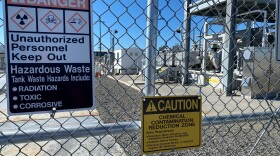-
President Donald Trump's administration will have to face one of our state's thorniest environmental problems: radioactive waste warehoused in southeast Washington.
-
A conservative policy roadmap — and past actions from the new president's first term — could offer clues as to what he might have in store for one of the most radioactive places in the world.
-
Washington state and two federal agencies have finalized a deal on how to clean up the radioactive tank waste in Hanford.
-
Amazon’s push for small modular nuclear reactors is just the latest development in a decades-long fight over nuclear energy.
-
The sides had been arguing over pay and working conditions when talks broke down. The company then barred the workers from their shifts and brought in replacements.
-
The Heritage Foundation’s blueprint proposes reclassifying radioactive waste as something less dangerous so it can be disposed of more cheaply.
-
Climate change increasingly threatens some of the nation's most sensitive sites, including research laboratories, military facilities and power plants with radioactive materials.
-
Three government agencies made a plan public for how to move forward and clean up radioactive waste from large, underground tanks at the Hanford site in southeast Washington.
-
Hanford managers and watchdogs hold public meeting to discuss current cleanup and future plans at the site
-
Companies are interested, but it could be complicated to develop lands with multiple layers of tribal, federal and even complex-science concerns
Play Live Radio
Next Up:
0:00
0:00
Available On Air Stations








